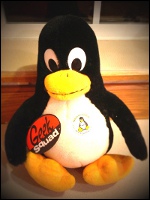 Trying to remember the name of the company that brought a bunch of game ports to Linux really brought back some nostalgic memories for me today.
Trying to remember the name of the company that brought a bunch of game ports to Linux really brought back some nostalgic memories for me today.
I sometimes forget just how crazy I was into Linux from around 1997 to 2004. I was all about the non-Windows operating systems. BeOS, Solaris, every flavor of Linux available, I tried them all.
1999 seemed like such a magical year for Linux. Thanks to Loki Software, you could go into a computer store and actually find boxed games like Unreal Tournament or Tribes 2 ported for the alternative OS. You could even pick up one of the 3 or 4 Linux magazines that made their way to shelves. I wanted to become a Red Hat Certified Engineer (RHCE). I still have my stuffed Tux the Penguin.
2000 hit and the promise of “Year of Linux on the Desktop” seemed to go away almost as quickly as it came. Loki Games ran out of funding, and the Linux magazines started dissappearing.
Linux was still around, but it lost some of the magic it had during that time by, of all things, becoming a much easier to install and use operating system. I switched from running Red Hat to Fedora, and then finally to Ubuntu. Ubuntu has made amazing strides in being a strong, daily use desktop Linux, everything that the “Year of Linux on the Desktop” promised.
It was everything I wanted from Linux, and yet, paradoxically, I found myself less interested in running each new version because of how “easy” and “safe” it had become. No longer having to compile your kernel to get decent performance, no longer having to fight dependency issues with the various package managers.
Once 2005 had rolled around, I had relegated it to file server status in my home use, with OS X and Windows on my workstations so that I could get back into “mainstream” practice. My love affair with Linux isn’t entirely over, but I will still look fondly for the more wild times it provided.
